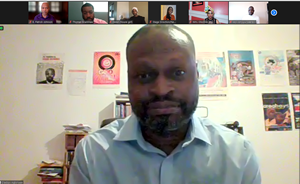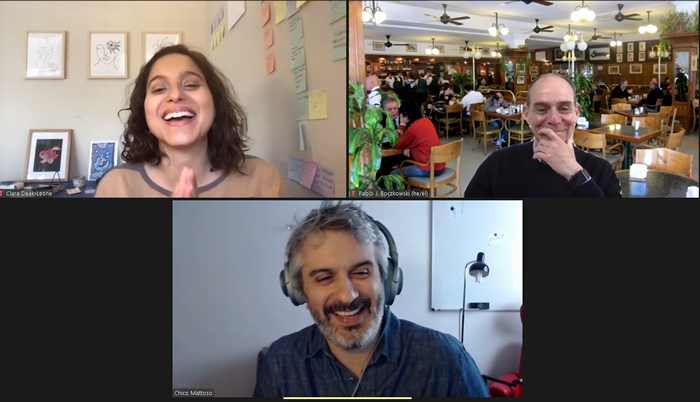Universal stories transcend language and place yet also are anchored by them, according to two spring-quarter campus speakers—a British-Nigerian playwright and a Brazilian alumnus with an HBO Max series.

Oladipo Agboluaje, winner of the Alfred Fagon Prize in playwriting and currently a royal literary fellow at the University of East London, took part in a Q&A session on April 30. It was cosponsored by the Black Arts Consortium and the Buffet Institute for Global Affairs’ Global Campus Collaborative Grant, which helps connect Northwestern to global scholars and artists around the world.
Moderated by Dean Johnson and radio/television/film professor Thomas Bradshaw, the Q&A followed a Zoom reading of Agboluaje’s play Iya-lle (The First Wife), which was nominated for an Olivier Award, British theatre’s highest honor. Agboluaje talked about the play’s universal themes of family politics and infidelity as well as his intentionally challenging use of Nigerian colloquialisms and language to tell the story of a family negotiating social and political upheaval in Lagos in 1989.
“I remember the first time we sent this script in, the artistic director said, ‘What the hell is this? I can’t understand a word of it,’” Agboluaje said. “I said to him, ‘Imagine so many students all over Africa reading Shakespeare. We read plays all over, and most of them are full of colloquialisms, full of localisms and so on and so forth. And we had to learn. We had no choice. If you’re going to pass your exam, you’re going to learn it. In a sense, what I wanted to do was to put a Nigerian audience in England in a position where they are the ones in a sense who own meaning. It was so noisy in the auditorium, because Nigerians were explaining to non-Nigerians what all the Nigerian words meant.”

Chico Mattoso (GC13), an MFA in writing for the screen and stage alumnus and cocreator of HBO Max’s Pico de Neblina, also set out to write something universal yet rooted in his homeland. His April 23 Zoom Q&A was cosponsored by EPICS, the Center for Latinx Digital Media, and the Buffet Institute for Global Affairs. The session was moderated by Pablo Boczkowski, the Hamad Bin Khalifa Al-Thani Professor in the Department of Communication Studies, and Brazilian screenwriter and MFA in writing for the screen and stage student Clara Leone.
Mattoso’s Pico de Neblina imagines a time when marijuana is legalized in Brazil and a former drug dealer struggles to find work. “I wanted to make a story that could be enjoyed by anybody, but of course the theme is very Brazilian, because there are a growing number of countries that have been legalizing marijuana in the last few years, but in Brazil, things are a little different,” he said, noting that the conservative government has stalled any movement on legalization. “It was a Brazilian approach to a theme that’s universal. The series isn’t just about marijuana, it’s a playground where stories happen. The series is about human relationships and the choices people make. We felt that it was universal enough. There was an interest from HBO, because they have branches all over the world, and they want their shows to be seen and enjoyed by everyone.”
